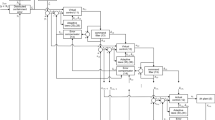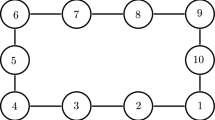Abstract
This work addresses the memory event-triggered consensus control design problems of multi-agent systems (MASs) under actuator failures and aperiodic denial-of-service (DoS) attacks. In order to overcome an unpredictable traffic in the network communication channel, an appropriate memory event-triggered scheme (METS) is proposed. The purpose of this scheme is to utilize certain release packets to create new event compared with the existing event-triggered scheme (ETS). In this fashion, the event generator can achieve accurate decision as well as better performance of the control can be expected. Further, a new switched approach is established to describe the consensus performance of system model with aperiodic DoS attacks. By incorporating the Lyapunov-Krasovskii functional (LKF), adequate constraints of the consensus for MASs are derived. Based on the obtained conditions, the consensus control gain matrices are presented by utilizing the technique of linear matrix inequalities (LMIs). Eventually, simulation results are given to validate the applicability of the proposed theoretical results which is based on the F-18 aircraft model systems.
Similar content being viewed by others
References
M. He and X. Mu, “H∞ containment control of multi-agent systems with random communication time-varying delay,” International Journal of Control, Automation, and Systems, vol. 18, no. 4, pp. 922–929, 2020.
D. Ye and X. Yang, “Distributed event-triggered consensus for nonlinear multi-agent systems subject to cyber attacks,” Information Sciences, vol. 473, pp. 178–189, January 2019.
A. Parivallal, R. Sakthivel, F. Alzahrani, and A. Leelamani, “Quantized guaranteed cost memory consensus for nonlinear multi-agent systems with switching topology and actuator faults,” Physica A: Statistical Mechanics and its Applications, vol. 539, p. 122946, February 2020.
Z. Cheng, D. Yue, S. Hu, H. Ge, and L. Chen, “Distributed event-triggered consensus of multi-agent systems under periodic DoS jamming attacks,” Neurocomputing, vol. 400, pp. 458–466, August 2020.
Z. Hu, S. Liu, L. Yang, and L. Wu, “Distributed fuzzy filtering for load frequency control of non-linear interconnected power systems under cyber-physical attacks,” IET Control Theory & Applications, vol. 14, no. 4, pp. 527–538, March 2020.
M. Sathishkumar and Y.-C. Liu, “Hybrid-triggered reliable dissipative control for singular networked cascade control systems with cyber-attacks,” Journal of the Franklin Institute, vol. 357, no. 7, pp. 4008–4033, May 2020.
M. Sathishkumar and Y.-C. Liu, “Resilient event-triggered fault-tolerant control for networked control systems with randomly occurring nonlinearities and DoS attacks,” International Journal of Systems Science, vol. 51, no. 14, pp. 2712–2732, August 2020.
W. He, X. Gao, W. Zhong, and F. Qian, “Secure impulsive synchronization control of multi-agent systems under deception attacks,” Information Sciences, vol. 459, pp. 354–368, August 2018.
R. Ma, P. Shi, Z. Wang, and L. Wu, “Resilient filtering for cyber-physical systems under denial-of-service attacks,” International Journal of Robust and Nonlinear Control, vol. 30, no. 5, pp. 1754–1769, March 2020.
L. Zha, J. Liu, and J. Cao, “Resilient event-triggered consensus control for nonlinear multi-agent systems with DoS attacks,” Journal of the Franklin Institute, vol. 356, no. 13, pp. 7071–7090, September 2019.
C. D. Persis and P. Tesi, “Input-to-state stabilizing control under Denial-of-Service,” IEEE Transactions on Automatic Control, vol. 60, no. 11, pp. 2930–2944, November 2015.
Y. Xu, Z. G. Wu, Y. J. Pan, M. Chadli, and T. Huang, “Input-based event-triggering consensus of multiagent systems under denial-of-service attacks,” IEEE Transactions on Systems, Man, and Cybernetics: Systems, vol. 50, no. 4, pp. 1455–1464, April 2020.
P. Yang, B. Ma, Y. Dong, and J. Liu, “Fault-tolerant consensus of leader-following multi-agent systems based on distributed fault estimation observery,” International Journal of Control, Automation, and Systems, vol. 16, pp. 2354–2362, September 2018.
J. Gong, B. Jiang, and Q. Shen, “Distributed-observer-based fault tolerant control design for nonlinear multiagent systems,” International Journal of Control, Automation, and Systems, vol. 17, pp. 3149–3157, July 2019.
Y. Wang, J. Xia, Z. Wang, J. Zhou, and H. Shen, “Reliable consensus control for semi-Markov jump multi-agent systems: A leader-following strategy,” Journal of the Franklin Institute, vol. 356, no. 6, pp. 3612–3627, April 2019.
C.-H. Xie and G.-H. Yang, “Cooperative guaranteed cost fault-tolerant control for multi-agent systems with time-varying actuator faults,” Neurocomputing, vol. 214, pp. 382–390, November 2016.
L. Ding, Q. L. Han, X. Ge and X. M. Zhang, “An overview of recent advances in event-triggered consensus of multiagent systems,” IEEE Transactions on Cybernetics, vol. 48, no. 4, pp. 1110–1123, April 2018.
C. Peng, J. Zhang, and H. Yan, “Adaptive event-triggering H load frequency control for network-based power systems,” IEEE Transactions on Industrial Electronics, vol. 65, no. 2, pp. 1685–1694, February 2018.
K. Wang, E. Tian, S. Shen, L. Wei, and J. Zhang, “Input-output finite-time stability for networked control systems with memory event-triggered scheme,” Journal of the Franklin Institute, vol. 356, no. 15, pp. 8507–8520, October 2019.
E. Tian, K. Wang, X. Zhao, S. Shen, and J. Liu, “An improved memory-event-triggered control for networked control systems,” Journal of the Franklin Institute, vol. 356, no. 13, pp. 7210–7223, September 2019.
K. Wang, E. Tian, J. Liu, L. Wei, and D. Yue, “Resilient control of networked control systems under deception attacks: A memory-event-triggered communication scheme,” International Journal of Robust and Nonlinear Control, vol. 30, no. 4, pp. 1534–1548, March 2020.
Z. Feng, G. Hu, and G. Wen, “Distributed consensus tracking for multi-agent systems under two types of attacks,” International Journal of Robust and Nonlinear Control, vol. 26, no. 5, pp. 896–918, March 2016.
R. Adams, J. Buffington, A. Sparks, and S. Banda, Robust Multivariable Flight Control, Springer-Verlag, London, U.K., 1994.
D. Yue, E. Tian, and Q.-L. Han, “A delay system method for designing event-triggered controllers of networked control systems,” IEEE Transactions on Automatic Control, vol. 58, no. 2, pp. 475–481, February 2013.
Author information
Authors and Affiliations
Corresponding author
Additional information
This work was supported by the Ministry of Science and Technology, Taiwan, under Grants MOST 109-2636-E-006-019, MOST 110-2636-E-006-005, and MOST 111-2636-E-006-004.
Murugesan Sathishkumar received his B.Sc. degree in Mathematics from Government Arts College, Coimbatore in 2009, and received his M.Sc. and M.Phil. degrees in mathematics from Sri Ramakrishna Mission Vidyalaya College of Arts and Science affiliated to Bharathiar University, India, in 2011 and 2013, respectively. He received a Ph.D. degree in mathematics from Anna University, Chennai, India, in 2018. From 2013 to 2014, he was an Assistant Professor with the Department of Mathematics, Christ the King Engineering College, Coimbatore, India. He is currently a Post-Doctoral Research Fellow in the Department of Mechanical Engineering, National Cheng Kung University, Tainan, Taiwan. His current research interests include networked control system and its security control, multi-agent systems, and time-delay systems.
Yen-Chen Liu received his B.S. and M.S. degrees in mechanical engineering from National Chiao Tung University, Hsinchu, Taiwan, in 2003 and 2005, respectively, and a Ph.D. degree in mechanical engineering from the University of Maryland, College Park, MD, USA, in 2012. He is currently an Associate Professor with the Department of Mechanical Engineering, National Cheng Kung University (NCKU), Tainan, Taiwan. His research interests include control of networked robotic systems, bilateral teleoperation, multi-robot systems, mobile robot network, and human-robot interaction. Dr. Liu was the recipient of the Ta-You Wu Memorial Award, Ministry of Science and Technology (MOST), Taiwan, 2016, Kwoh-Ting Li Researcher Award, National Cheng Kung University, Taiwan, 2018, and Young Scholar Fellowship — Columbus Program, MOST, Taiwan, 2019.
Publisher’s Note
Springer Nature remains neutral with regard to jurisdictional claims in published maps and institutional affiliations.
Rights and permissions
About this article
Cite this article
Sathishkumar, M., Liu, YC. Resilient Memory Event-triggered Consensus Control for Multi-agent Systems with Aperiodic DoS Attacks. Int. J. Control Autom. Syst. 20, 1800–1813 (2022). https://doi.org/10.1007/s12555-021-0380-x
Received:
Revised:
Accepted:
Published:
Issue Date:
DOI: https://doi.org/10.1007/s12555-021-0380-x




